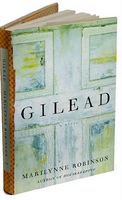
This is a rare and beautiful book, literate and elegant, filled with light and grace. It’s a familiar tale of fathers and sons, and of complex relationships that life bequeaths on people who love and think deeply. The name Gilead is surely apt. It describes the town that Reverend John Ames serves, as well as supplies the metaphor for the necessity of redemption that dogs the man who knows God as much as the one who won’t.
It is 1956, and the ailing 77-year old Reverend decides to write a letter to his six year-old son. Ames is the son of an Iowan preacher, and the grandson of a minister. The book Gilead is that letter, a thoughtful account of a 3rd generation preacher whose love for the Word is equaled only by his passion for life. Ames knows he hasn't long to live, and submits this confessional to a son he loves dearly, regretting that he would not be there to see him grow up. In prose brimming with compassion – sometimes didactic, and often stilted in keeping with the times – there is an uncanny brilliance that I find quite moving:
“My point here is that the great kindness and providence of the Lord has given most of us someone to honor – the child his parent, the parent his child I have great respect for the uprightness of your character and the goodness of your heart, and your mother could not love you more or take greater pride in you. She has watched every moment of your life, almost, and she loves you as God does, to the marrow of your bones. So there is the honoring of the child. You see how it is godlike to love the being of someone. Your existence is a delight to us. I hope you never have to long for a child as I did, but oh, what a splendid thing it has been that you came finally, and what a blessing to enjoy you now for almost seven years.”In the story, Ames writes of a grandfather who was an old radical who preached men into the civil war, and the hungry years brought about by the Reverend’s own gentle father who put more into his ministry than his own family – not for want of love, but due to a spiritual forgetfulness (common among people in the ministry, it seems). In the course of the tale, he has to deal with 43-year old prodigal Jack Boughton, who’s come back to visit his aging and dying father. Jack’s father is himself a preacher and Ames’ best man at his second marriage.
The unbelieving Jack nips at Ames faith and sensibility by his intelligence and strength of personality. It is in tension and disquiet that faith matures, finding expression in love that “covers a multitude of sins” (1 Pe 4:8). For Reverend Ames, the temperance of age smoothens the hard edges of a strained relationship, softens resistance to one who has walked out on the very faith that defines his vocation. Yet it is the recognition of his inner turbulence (although by his own admission, he was the ‘good son’ who never left his father’s house) that reveals his personal need for the grace of God too. Yes, those who tend to the needy must needs be tended to. The courage to embrace the mystery of God’s grace begins with the willingness to see the extravagance that love brings.
“I am one of those righteous for whom the rejoicing in heaven will be comparatively restrained. And that’s all right. There is no justice in love, no proportion in it, and there need not be, because in any specific instance it is only a glimpse or parable of an embracing, incomprehensible reality. It makes no sense at all because it is the eternal breaking in on the temporal.”It is this that leads Ames to reconcile himself with the younger Jack and towards the end of the book, to bless him. The summation of life and vocation comes at a single instance right there on the street as Ames places his hand on Jack's head while the benediction from Numbers is recited. Later he imagines what it would have been like if Jack's father had only seen this unlikely sight:
"It is almost as if I felt his hand on my hand. Well, I can imagine him beyond the world, looking back at me with an amzement of realization - "This is why we have lived this life!" There are a thousand thousand reasons to live this life, every one of them sufficient."This is a marvellous book, so sensitively written and evocative of a bygone era, it has to be to be savoured in slow measures. One critic said it was a book that "begs to be read aloud" and I do agree it lends itself wonderfully to such an effort (Merle Rubin, Los Angeles Times Book Review). The realism is more keenly felt when you know it's a novel that did not begin as 'Christian' literature, yet in its honesty, is true to life, and therefore reflects the presence of God. You can also read Chris Lehmann's review here which has the breadth and scope to match author Marilynne Robinson's vision.
Gilead is Marilynne Robinson’s second book and the winner of the Pulitzer Prize, 2005.
No comments:
Post a Comment